For Dominique Herqué, Korea is a country where dreams come true. He tills his land in the central region to produce wine in an all-natural way that reminds him of his childhood in France.
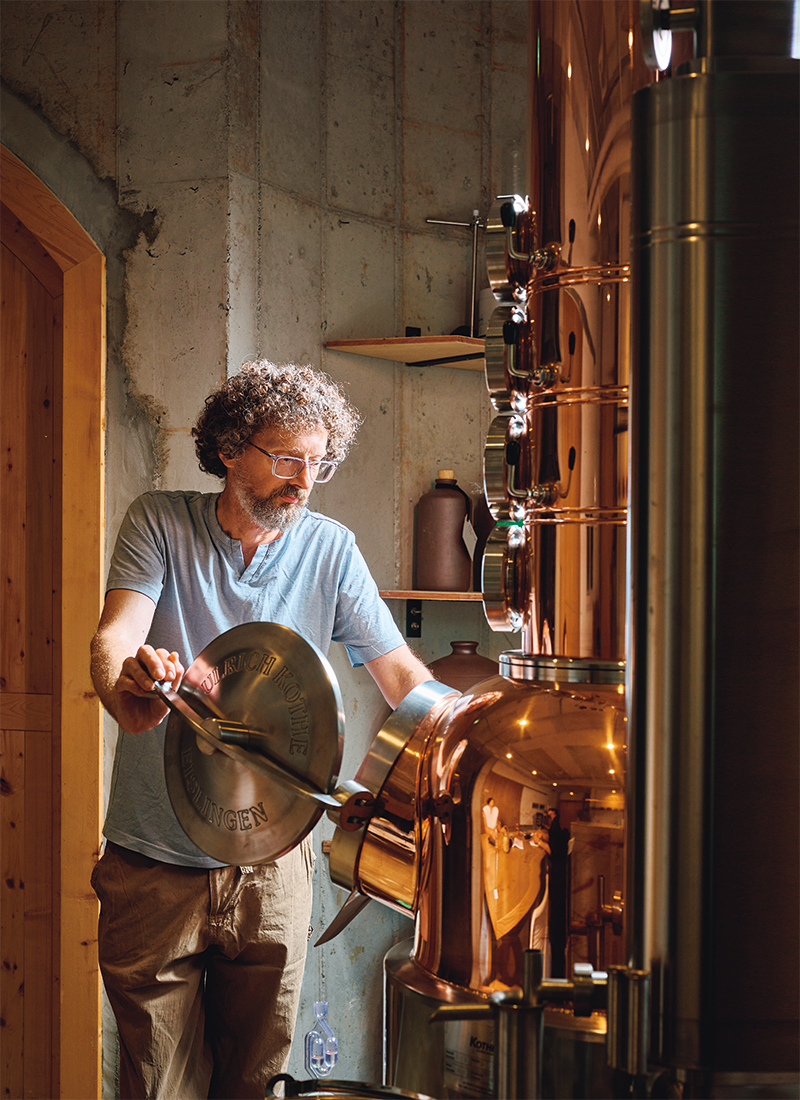
Born in Alsace, France, Dominique Herqué ended a long career as an engineer to pursue his dream of making wine. After studying enology and working at an Alsace winery, he and his wife founded a winery named Little Alsace in Korea’s landlocked North Chungcheong Province.
The little Alsace winery, where Dominique Herqué lives and works, is peaceful but not entirely tranquil. In the courtyard, swaying wind chimes tinkle n, while birds, chickens, and geese form a constant background chorus. However, the sounds of nature, which some may consider noise, are music to his ears.
The winery is nestled in Suanbo, a township in Chungju, North Chungcheong Province. Herqué and his wife, novelist Shin Ihyeon, say they fell in love with the place at first sight. A mountain looms in the rear and the front is unobstructed. The setting resembles Dominique’s hometown in Alsace, France’s easternmost wine region, where fertile soil and abundant sunshine provide perfect conditions for the numerous vineyards scattered throughout the rolling hills. Little Alsace mirrors those qualities, which comforts Herqué now that he is halfway around the world from where he grew up.
“Arriving in Korea in 2017, I spent one whole year moving around the country to try and find the right place for farming and winemaking,” Herqué explains. Then a friend recommended a plot of land in central Korea, and he immediately knew that he had found the right place for him.
LIKE A FOREST
Little Alsace’s vineyard covers around 4,000 square meters. Herqué and Shin call it a “forest-like vineyard.” The first years were devoted to getting the soil ready. Herqué poured mounds of fallen leaves, sesame stalks, and five tons of rice bran into the soil. About three years later, the soil’s fertility reached a level he deemed “incredible.” The focus now is on maintaining the health of the land to ensure that their wine tastes right. Good wine comes from well-tended land, and good fruit comes from fertile soil.
The winery has over ten varieties of grapevines and around 30 varieties of apple trees. They helpa diversity of flavors in the wine. The grapevines and apple trees are joined by over 100 other plant species, including peach, jujube, persimmon, fig, mulberry, kiwi, and lavender, among others. Parts of the trees are eventually used to make compost, enabling the couple to eschew herbicides or pesticides. The trees, along with chickens, geese, bees, earthworms, and diverse microorganisms thrive symbiotically, benefiting one another.
All of this constitutes the terroir of Little Alsace. Winemakers use this French term, derived from terre, or land, and roughly translated as “sense of place,” in a way others may speak about an ecosystem.
Believing that plants respond to the movement of planets, Herqué follows French farming methods that align with the planetary calendar instead of the 365-day solar calendar. “There are specific days which are good for fruit, roots, leaves, and flowers, respectively. We simply follow the wisdom of life accumulated through the centuries.”
Herqué also considers the weather forecast when weighing the possible tasks of a particular day. For example, trimming the grass could expose fresh shoots to frost a few days later. On the other hand, if the grass stays untrimmed and heavy rain were to fall, insects would swarm in it. These are precious lessons learned from past failures. The overall work routine is the same, but no two years are identical in timing.
THE INVENTORY
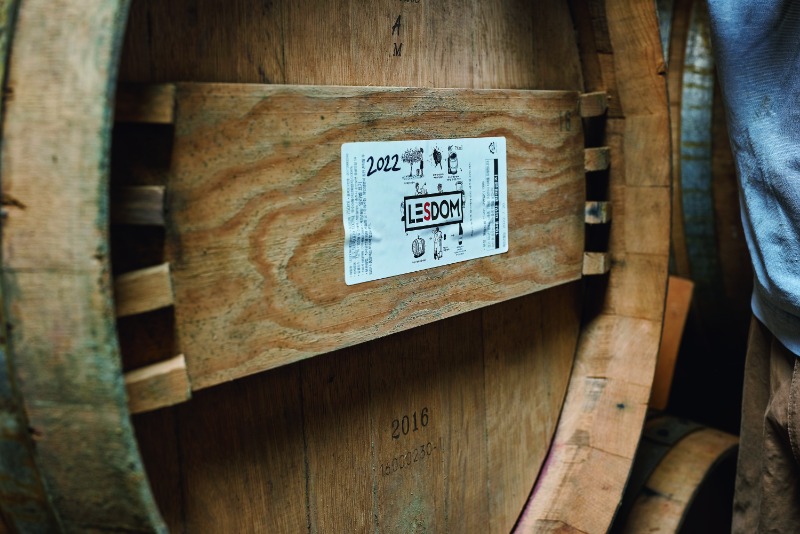
Natural red wine ages in an oak barrel at Little Alsace. The winery’s brand name is LESDOM, a portmanteau of the French plural article “les” and a diminutive form of Dominique, the winegrower’s given name.
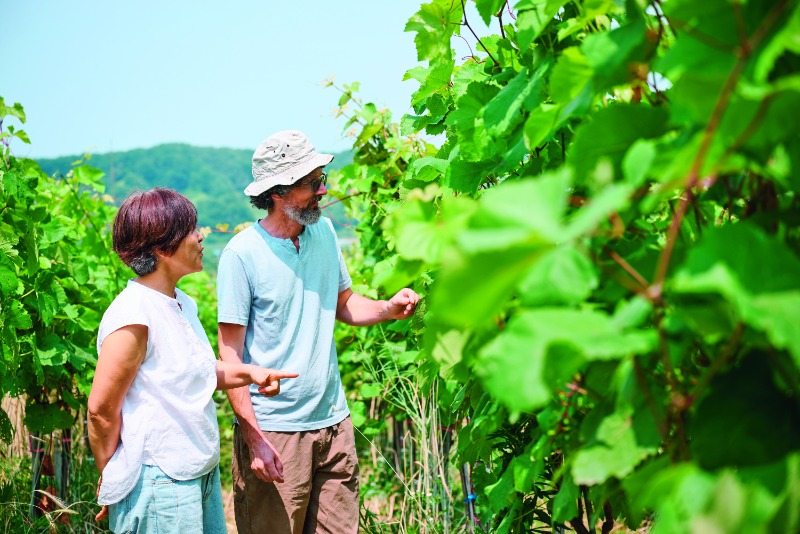
Delicious fruits play a crucial role in shaping the taste of the wine. They are grown by using sustainable farming methods without any harmful chemicals. The couple also raise geese and chickens, and take care of earthworms and tiny organisms in the soil.
Little Alsace offers cidre, or cider in English, as well as rosé and red wine. While the cidre is made from fermented apples, the rosé is made only with grapes, and the red wine with a blend of grapes and sanmeoru (Vitis amurensis).
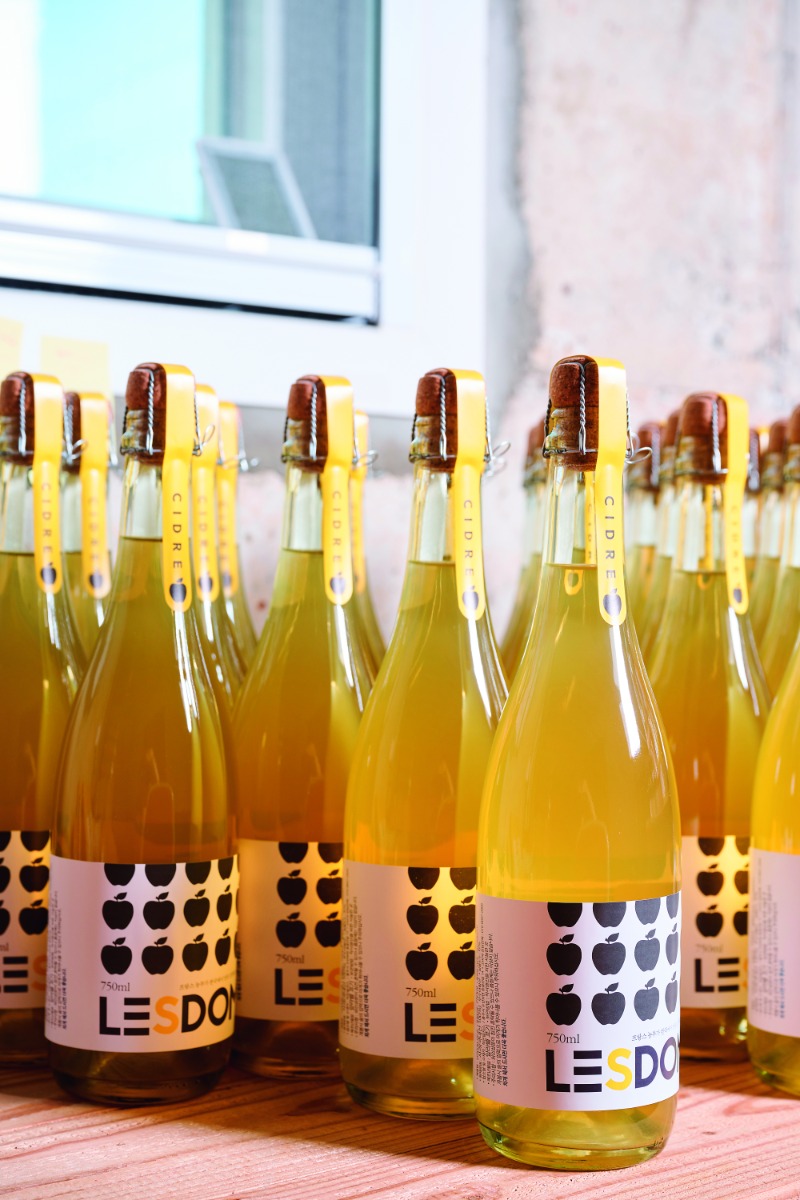
The natural cidre made from apples is the flagship product of Little Alsace. The winery has 30 types of apple trees.
The entire process, including fermentation, takes over a year. Herqué and Shin never use additives, not even yeast. The winery’s terroir and the couple’s dedication and hard work are encapsulated in a bottle of Little Alsace’s truly natural wine.
The brand name, LESDOM, is a portmanteau of “les,” the plural form of the French article “le,” and the diminutive of Herqué’s given name, Dominique. It stands for the “Dominique Family.”
LIFE CHANGES
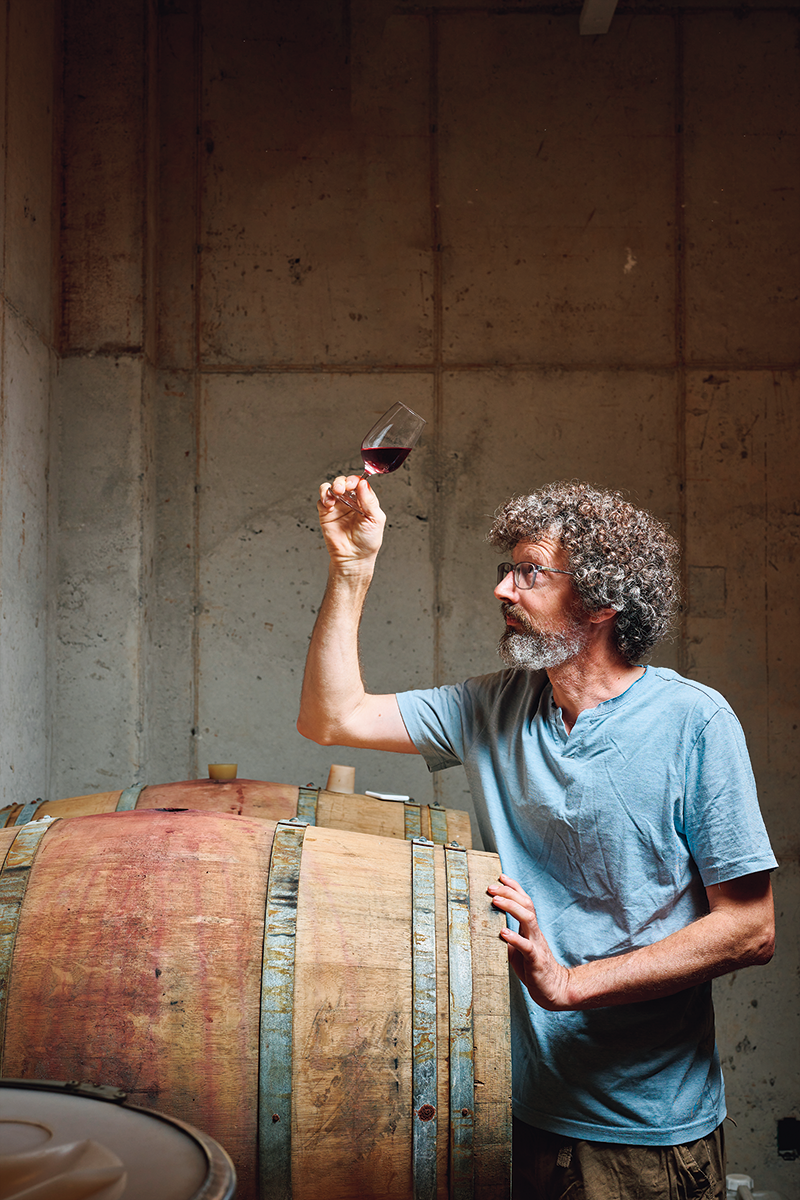
Herqué checks the clarity of his red wine. He focuses on encapsulating the particular character and flavors of the land where the fruits are grown and preserves them in each bottle, rather than seeking a standardized taste.
Shin Ihyeon joined the Korean literary community in 1994 with her novel A Room Good for Hiding. She and Herqué met in Paris in 1998. Back then, Herqué was a computer programmer in Paris, and Shin was fulfilling her dream of living in France for about a year.
The first encounter was at a housewarming party by a Vietnamese couple they both knew. Shin and Herqué were immediately attracted to each other, and their romance began. Shin soon dropped her one-year plan, and five years later they got married. Afterward, Herqué was first relocated to Cambodia, where the couple stayed for six years, and then to Korea.
Herqué recalls that the early days of working in Korea were not particularly happy ones. He was swamped with responsibilities. “I was so caught up in my work that I could not attend to the other aspects of my life. However, looking back, I also feel grateful. It was during this period that the dream of becoming a farmer took root in my heart.”
His maternal grandfather, who dedicated his entire life to cultivating vineyards in Alsace, left equal parts of the land to his children. The vineyards were Herqué’s childhood playground, and during the harvest season, they became his workspace. He began to yearn for those days.
To turn his dream into reality, Herqué returned to France and studied for two years at the CNEAC (Centre National d’Enseignement Agricole par Correspondance) agricultural school before spending a year training at a wine-making facility. At first, he set his mind on cultivating grapes in France but no location satisfied him. Shin was also hesitating; in France, she had never lived outside of Paris, and so she expressed, for the first time, worries about living in a foreign country.
“She suggested going to Korea, since there was no place that produced cidre in the traditional European way, allowing us to venture into new territory. I was happy just to be able to make wine,” Dominique recalls.
And so the pair came back to Korea and Little Alsace was born, quenching Herqué’s yearning for the past. “That longing turned into a dream, and it was in Korea that this dream eventually came true.” Farming helped him better understand Korea, a country he had little knowledge of before he met his wife. Indeed, he is truly grateful to his adopted home for giving him the opportunity to fulfill his dreams.
NEW WORKS
Little Alsace produces some 10,000 bottles annually. They are sold through the winery’s website and wine-tasting events. Visitors to the vineyard are welcome to sample the offerings, which often leads to sales. The prices for a bottle range from 32,000 to 48,000 won.
Last year, a new building for the company’s operations was completed. There is more space than needed, so the couple plans to use part of it to share information on ecological farming methods and natural wine-making techniques, as well as to hold exhibitions related to alcoholic beverages and agriculture. Herqué thinks that his wife is best suited to take the lead in those activities. “Just the thought of this space being used in these ways makes me happy.”
As soon as the sun rises, Herqué steps onto his land to greet its many living things. He stays inside while the sunshine is too strong but goes out again once the heat subsides to till the land until the last sliver of sun disappears.
Recently, he began to use ropes to ensure the grapevine branches grow upwards instead of drooping. This job is physically demanding because the vines are young and can be compared to temperamental teenagers. But he often finds himself smiling as he faces new challenges. A smile reflecting the happiness he has found in Korea.